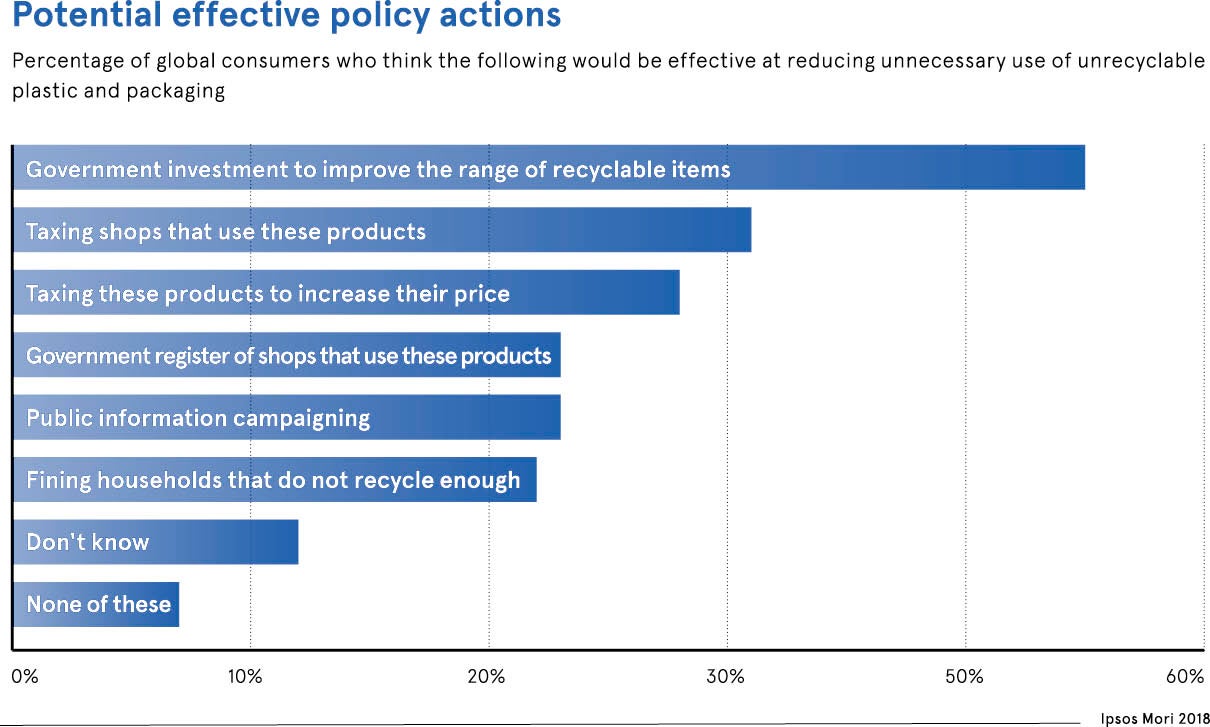When it comes to packaging, everyone agrees on the need for change. Consumers, green campaigners, government bodies, supermarkets and retailers all want a shift in the way we make and recycle packaging materials, especially plastic. UK producers of packaging are well aware of public angst about plastic waste. Many have signed up to the UK Plastics Pact, a voluntary pledge to create “a circular system where we keep plastic in the economy and out of natural environment”. Targets to be met by 2025 include recycling or composting 70 per cent of plastic packaging and achieving 30 per cent recycled content in all new plastic packaging.
The transformation required is huge, big enough for the packaging industry to accept government will play a crucial role in supporting the transition. So what can political leaders do to enable the big switch to more sustainable forms of packaging? What lessons can be learnt from regulatory action taken around the world?
Governments legislate to reduce plastic waste
Some governments have drafted legislation to get rid of the most unnecessary materials. France has introduced a ban on plastic plates, cups and cutlery, with the new rules coming into effect in 2020. India has pledged to bring in a blanket ban on all single-use plastic items by 2022. Taiwan has announced plans to do the same by 2030.
In the UK, meanwhile, the Department for Environment, Food and Rural Affairs is pondering legislation to remove plastic straws, cotton buds and other single-use plastics from sale. Ministers are also considering a deposit return scheme to reward people for returning plastic bottles and other drinks containers.
The most important intervention may be something more complex and subtle: reform of the Packaging Waste Recovery Note scheme. At the moment those responsible for the UK’s packaging are obliged to meet some of the costs involved in running the country’s recycling system, but many environmentalists believe they should be paying a lot more.
“Producers in the UK are getting away with paying very little for compliance at the moment, contributing very little to the collection and sorting system in comparison with many countries in Europe,” says Dominic Hogg, chairman of the research group Eunomia.
Need for more high-quality material in the system
The producers, however, say the nation’s recycling infrastructure is simply not good enough. If they are going to be asked to pay more, they want the funds invested wisely. “We want to make sure the money goes where it needs to go to improve collection and create better sorting and recycling facilities,” says Martin Kersh, executive director of the Foodservice Packaging Association.
The main problem, both environmentalists and packagers agree, is the lack of high-quality, recyclable material in the system. Local authority collection systems vary wildly across the country. And the separation of waste at materials recovery facilities is often not sophisticated enough to give reprocessing companies the chance to deliver enough pure, recyclable plastic pellets for new packaging.
Forming plastic products entirely out of recycled plastic pellets remains difficult to do. The technology used to break down different kinds of polymers is still fairly crude and recycling any piece of plastic usually downgrades its quality.
China’s ban passes the buck back to Britain
It helps explain why getting rid of plastic waste by shipping it off to China has been an all-too-convenient option for many western nations. According to a recent report from Green Alliance, two thirds of the UK’s annual plastic waste has been exported and only 9 per cent recycled domestically.
Earlier this year, however, China imposed a ban on foreign plastic waste. So the UK and others in the West have little choice. We must get better at recycling.
There is a role for government to underpin voluntary schemes with regulation
Green Alliance hopes government will step in to jump-start the market for recovered materials, creating new jobs and boosting innovation. The group’s latest report recommends legislation insisting all new packaging has a minimum proportion of recycled content. “There is a role for government to underpin voluntary schemes with regulation,” says Libby Peake, senior policy adviser at Green Alliance.
Another suggested policy is giving subsidies to reprocessors that create high-quality materials and manufacturers using it to create new packaging with higher levels of recycled content.
Reducing plastic waste will not be a one-size-fits-all recycling solution
California acts as a guiding light when it comes to fine-tuning the recycling infrastructure. The US state assisted the recycling efforts of the plastic reprocessors and producers by funding a market development programme with the unclaimed deposits from a bottle deposit scheme. Between 2007 and 2014 the proportion of California’s plastic waste exported overseas fell from 90 per cent to 50 per cent.
Some UK producers have warned against a narrow obsession with plastic waste when considering any of these policies. Over the last 15 years, the UK’s glass and paper industries have been forced to adjust to “commingled” waste as glass and paper were lumped in with plastic in a bid to increase kerbside collection of plastic. The difficulty in separating out these materials forced up the price of high-quality glass and paper for recycling.
“The current focus is on solving a plastics problem, but we need to be careful not to build a one-size-fits-all solution that does not take account of the existing success of other materials,” says Dave Dalton, chief executive at British Glass.
The status quo is no longer an option. Government will have to act to cut waste. But if the right mechanisms can be found to usher in the circular economy, the packaging industry appears ready and willing to join a revolution in waste reduction.
Governments legislate to reduce plastic waste
Need for more high-quality material in the system

